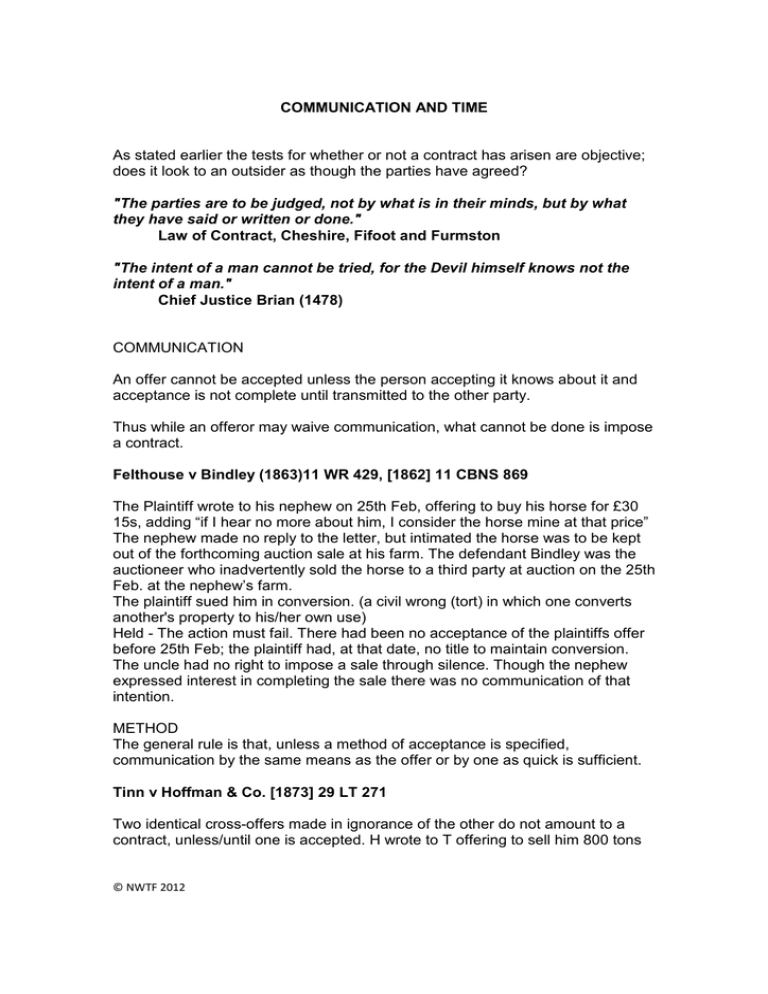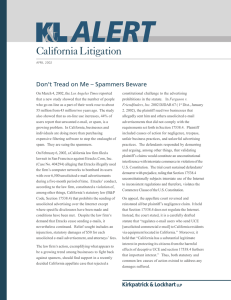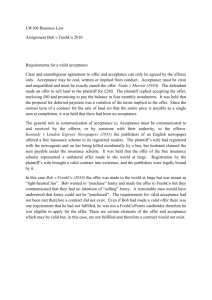COMMUNICATION AND TIME As stated earlier the tests for whether
advertisement

COMMUNICATION AND TIME As stated earlier the tests for whether or not a contract has arisen are objective; does it look to an outsider as though the parties have agreed? "The parties are to be judged, not by what is in their minds, but by what they have said or written or done." Law of Contract, Cheshire, Fifoot and Furmston "The intent of a man cannot be tried, for the Devil himself knows not the intent of a man." Chief Justice Brian (1478) COMMUNICATION An offer cannot be accepted unless the person accepting it knows about it and acceptance is not complete until transmitted to the other party. Thus while an offeror may waive communication, what cannot be done is impose a contract. Felthouse v Bindley (1863)11 WR 429, [1862] 11 CBNS 869 The Plaintiff wrote to his nephew on 25th Feb, offering to buy his horse for £30 15s, adding “if I hear no more about him, I consider the horse mine at that price” The nephew made no reply to the letter, but intimated the horse was to be kept out of the forthcoming auction sale at his farm. The defendant Bindley was the auctioneer who inadvertently sold the horse to a third party at auction on the 25th Feb. at the nephew’s farm. The plaintiff sued him in conversion. (a civil wrong (tort) in which one converts another's property to his/her own use) Held - The action must fail. There had been no acceptance of the plaintiffs offer before 25th Feb; the plaintiff had, at that date, no title to maintain conversion. The uncle had no right to impose a sale through silence. Though the nephew expressed interest in completing the sale there was no communication of that intention. METHOD The general rule is that, unless a method of acceptance is specified, communication by the same means as the offer or by one as quick is sufficient. Tinn v Hoffman & Co. [1873] 29 LT 271 Two identical cross-offers made in ignorance of the other do not amount to a contract, unless/until one is accepted. H wrote to T offering to sell him 800 tons © NWTF 2012 of iron at 69s per ton. On the same day T wrote to H offering to buy on the same terms. Held - No contract existed. The simultaneous cross-offers made in ignorance of each other, would not bind the parties Blackburn J stated: “. . . The promise or offer made on each side in ignorance of the promise or offer made on the other side, neither of them can be construed as an acceptance of the other.” If a method is prescribed without it being made clear that no other method will suffice then it seems that an equally advantageous method would suffice However, if the offeror states the acceptance is to be by one method and that method only then acceptance by any other method is invalid. TIME AND PLACE As communication is required an acceptance only takes place when received by the offeror. Entores Ltd. v Miles Far East Corpn. [1955] 2 QB 327 The plaintiffs were a London company, the defendants American with agents in Amsterdam. Both had telex machines. By telex the plaintiff made an offer to the defendant’s agents in Amsterdam to buy goods from them, and it was agreed by telex sent to London. Held - The Court of Appeal, Ruled it had been made in London: the postal rule applies only to ordinary letters. The sender of a Telex message knows almost immediately whether or not it has been received, so there is no period of uncertainty requiring a special rule. By analogy, it would seem that the same should apply to Fax messages, but the status of telephone answering machines has yet to be determined. Thus in such circumstances it is the time and place of receipt which is important, not where it is sent from. Brinkibon v Stahag Stahl und Stalwarenhandelsgesellschaft m. b. H. [1983] 2 AC 34 The House of Lords reaffirmed the above case, an alleged breach of contract because the contract had not been made within the court's jurisdiction. Lord Wilberforce stated that the present case is, as Entores itself, the simple case of instantaneous communication between principals, and, in accordance with the general rule, involves that the contract (if any) was made when and where the acceptance was received. This was in Vienna. There is a special rule as far as posting is concerned. © NWTF 2012 Byrne v Van Tienhoven [1880] 5 CPD 344 1 Oct. D (in Cardiff) posted a letter offering goods for sale.1000 boxes of tin plates. 8 Oct. D revoked the offer; which arrived on 20 Oct. 11 Oct. P (in New York) accepted by telegram 15 Oct. P posted a letter confirming acceptance. Held - The defendant's revocation was not effective until it was received on 20 Oct. This was too late as the contract was made on the 11th when the plaintiff sent a telegram. Judgment was given for the plaintiffs. Contract is complete when Acceptance is posted, Revocation can only take place when it is received. However; Holwell Securities Ltd v Hughes [1974] 1 All ER 161 The defendant gave the plaintiff an option to buy property which could be exercised within 6mths "by notice in writing". The plaintiffs posted a letter exercising this option but the letter was lost in the post and the plaintiffs claimed specific performance. Held - the Court of Appeal, that the option had not been validly exercised. Lawton LJ stated that the plaintiffs were unable to do what the agreement said they were to do, namely, fix the defendant with knowledge that they had decided to buy his property. There was no room for the application of the postal rule since the option agreement stipulated what had to be done to exercise the option. The words “within 6mths” negated the “Postal Rule The best result is achieved by stating where the contract is made in the offer document so that there can be no dispute over the applicable law. BATTLE OF FORMS Butler Machine Tool Co. v Ex-Cell-O Corp. [1979] 1 All ER 965 The plaintiffs offered to sell a machine to the defendants. The terms of the offer included a condition that “all orders were accepted only on the sellers' terms which were to prevail over any terms and conditions in the buyers' order, also any increase in the cost of manufacture shall be added to the price” The defendants replied ordering the machine but on different terms and conditions. At the foot of the order was a tear-off slip reading, "We accept your order on the Terms and Conditions stated thereon." The plaintiffs signed and returned it, writing, "your official order … is being entered in accordance with our revised quotation …". Held - the Court of Appeal, had to decide on which set of terms the contract was made. Lord Denning M.R. stated: “In many of these cases our traditional analysis of offer, counter-offer, rejection, acceptance and so forth is out-of-date. The better way is to look at all the documents passing between the parties and glean © NWTF 2012 from them, or from the conduct of the parties, whether they have reached agreement on all material points, even though there may be differences between the forms and conditions printed on the back of them. It will be found that in most cases when there is a "battle of forms" there is a contract as soon as the last of the forms is sent and received without objection being taken to it. Therefore, judgment was entered for the buyers. As a result, in the absence of any agreement in the processes of communication, the last form wins. END OF AN OFFER Acceptance Rejection Counter-offer Withdrawal Lapse Death Failure of Condition UNSOLICITED GOODS Amendments to the Unsolicited Goods & Services Act 1971 by SI 2000 No, 2334 and by the Consumer Protection from Unfair Trading Regs 2008 The Consumer Protection (Distance Selling) Regulations 2000 Inertia Selling 24. - (1) Paragraphs (2) and (3) apply if (a) unsolicited goods are sent to a person ("the recipient") with a view to his acquiring them; © NWTF 2012 (b) the recipient has no reasonable cause to believe that they were sent with a view to their being acquired for the purposes of a business; and (c) the recipient has neither agreed to acquire nor agreed to return them. (2) The recipient may, as between himself and the sender, use, deal with or dispose of the goods as if they were an unconditional gift to him. (3) The rights of the sender to the goods are extinguished. (4) A person who, not having reasonable cause to believe there is a right to payment, in the course of any business makes a demand for payment, or asserts a present or prospective right to payment, for what he knows are (a) unsolicited goods sent to another person with a view to his acquiring them for purposes other than those of his business, or (b) unsolicited services supplied to another person for purposes other than those of his business, is guilty of an offence and liable, on summary conviction, to a fine not exceeding level 4 on the standard scale. (5) A person who, not having reasonable cause to believe there is a right to payment, in the course of any business and with a view to obtaining payment for what he knows are unsolicited goods sent or services supplied as mentioned in paragraph (4) (a) threatens to bring any legal proceedings, or (b) places or causes to be placed the name of any person on a list of defaulters or debtors or threatens to do so, or (c) invokes or causes to be invoked any other collection procedure or threatens to do so, is guilty of an offence and liable, on summary conviction, to a fine not exceeding level 5 on the standard scale. (6) In this regulation "acquire" includes hire; "send" includes deliver; "sender", in relation to any goods, includes (a) any person on whose behalf or with whose consent the goods are sent; (b) any other person claiming through or under the sender or any person © NWTF 2012 mentioned in paragraph (a); and (c) any person who delivers the goods; and "unsolicited" means, in relation to goods sent or services supplied to any person, that they are sent or supplied without any prior request made by or on behalf of the recipient. (7) For the purposes of this regulation, an invoice or similar document which (a) states the amount of a payment, and (b) fails to comply with the requirements of regulations made under section 3A of the Unsolicited Goods and Services Act 1971 or, as the case may be, Article 6 of the Unsolicited Goods and Services (Northern Ireland) Order 1976 applicable to it, is to be regarded as asserting a right to the payment. (8) Section 3A of the Unsolicited Goods and Services Act 1971 applies for the purposes of this regulation in its application to England, Wales and Scotland as it applies for the purposes of that Act. (9) Article 6 of the Unsolicited Goods and Services (Northern Ireland) Order 1976 applies for the purposes of this regulation in its application to Northern Ireland as it applies for the purposes of that Order. (10) This regulation applies only to goods sent and services supplied after the date on which it comes into force. © NWTF 2012

